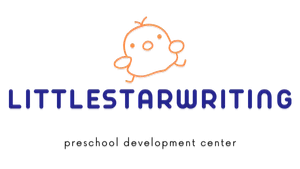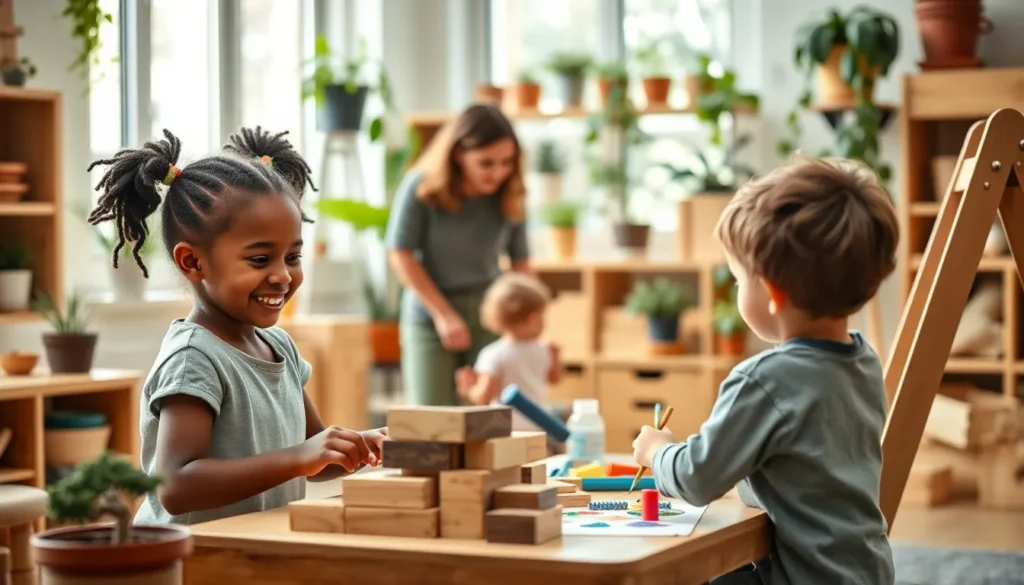Table of Contents
ToggleIn a world where every toddler seems to be a mini tornado, Montessori daycare offers a refreshing whirlwind of calm and creativity. Imagine a place where kids aren’t just herded like cats but encouraged to explore, learn, and grow at their own pace. It’s like a magical land where playtime meets education, and snack breaks come with a side of self-discovery.
Montessori daycare isn’t just about crayons and nap mats; it’s about fostering independence and curiosity. Children dive into hands-on activities that spark their imaginations while developing essential life skills. So, if you’re tired of traditional daycare options that resemble a scene from a chaotic circus, it might be time to consider the Montessori approach. Who knew learning could be this fun?
Overview of Montessori Daycare
Montessori daycare revolves around a child-centered educational philosophy design by Dr. Maria Montessori. This approach prioritizes the developmental needs of children by creating a supportive environment that promotes autonomy and hands-on learning. Children engage with materials purposefully, actively guiding their learning experiences.
Independent learning stands at the core of the Montessori method. In this setting, toddlers choose activities, allowing them to explore topics of interest at their own pace. Educators play a vital role by observing and facilitating rather than directing the learning process, ensuring that each child receives personalized attention.
Social development flourishes within a Montessori daycare. Mixed-age classrooms encourage collaboration and peer learning, enabling older children to mentor younger ones. This structure creates a sense of community where respect, empathy, and cooperation are cultivated.
Structured routines provide consistency and security. Predictable schedules help children feel settled and focused, contributing to a nurturing atmosphere. Daily activities range from practical life skills to sensory exploration, each designed to enhance cognitive, emotional, and social growth.
Research indicates that children who experience Montessori education often demonstrate increased creativity, problem-solving abilities, and critical thinking skills. The environment also fosters a love for learning, inspiring children to explore and question their surroundings. As parents seek quality early childhood education, Montessori daycare presents a compelling option that prioritizes holistic development.
Principles of Montessori Education

Montessori education emphasizes a holistic and individualized approach to learning, prioritizing children’s developmental needs. This method supports autonomy, creativity, and a sense of community.
Child-Centered Learning
Child-centered learning places each child’s interests and pace at the forefront. In this framework, educators observe rather than direct, enabling toddlers to pursue their curiosities. Activities tailored to individual preferences result in personalized learning experiences. Children gain confidence as they select tasks that resonate with them. Mixed-age classrooms foster collaboration, allowing younger and older children to learn from one another. By emphasizing independence, Montessori education cultivates essential life skills and promotes a strong sense of responsibility among students.
Hands-On Activities
Hands-on activities form the foundation of Montessori education, encouraging active engagement in the learning process. Children participate in practical tasks that inspire exploration and creativity. Materials designed to be manipulated and explored stimulate sensory experiences, enhancing cognitive development. This tactile approach reinforces concepts in real-world settings, making learning relevant and meaningful. Activities often include art, gardening, and simple cooking, allowing children to apply their knowledge in tangible ways. Such experiences not only build critical thinking skills but also foster a lasting passion for learning.
Benefits of Montessori Daycare
Montessori daycare offers significant advantages for early childhood development. This approach nurtures both cognitive and social skills, fostering well-rounded growth.
Cognitive Development
Montessori environments stimulate cognitive growth through hands-on learning opportunities. Children engage in self-directed activities that cater to their interests and developmental stages. Research shows that learners in Montessori settings often excel in problem-solving and critical thinking. They explore concepts such as mathematics and literacy using tangible materials, which enhance understanding and retention. Cognitive skills strengthen as children manipulate objects, explore new ideas, and discover solutions independently. Furthermore, fostering creativity becomes a natural byproduct, encouraging a lifelong enthusiasm for learning.
Social Skills Enhancement
Montessori daycare promotes social skills through mixed-age classrooms. Peer learning flourishes as older children mentor younger ones, building community bonds. Respect and empathy become central tenets as children collaborate on group activities. Structured routines also help establish trust and security, allowing children to express themselves openly. Students develop communication and conflict resolution skills organically, as they navigate social interactions. Connections formed in this environment contribute to healthy relationships, preparing children for future collaborative settings. Overall, Montessori daycare equips children with essential social tools critical for lifelong success.
Choosing the Right Montessori Daycare
Selecting the ideal Montessori daycare involves careful consideration. Parents should assess several critical factors to ensure a good fit for their child.
Key Factors to Consider
Reputation matters when choosing a Montessori daycare; research reviews and ask for recommendations. Look for accreditation that verifies adherence to Montessori principles, as this guarantees quality. Observe the classroom environment; it should feel inviting and well-organized. Teacher qualifications play a significant role; experienced educators should be trained in Montessori methods. Class sizes also affect student engagement; smaller groups often foster better individual attention. Evaluate the age range present, as mixed-age classrooms enhance social skills.
Questions to Ask
Inquire about the school’s philosophy; understanding its alignment with Montessori principles is crucial. Ask how the curriculum supports child autonomy and development, ensuring it focuses on individualized learning. Explore how teachers facilitate rather than direct learning, as this is central to Montessori education. Request details on daily routines to identify consistent structures that promote security. Discuss communication methods; a partnership between parents and educators is vital for ongoing support.
Success Stories from Montessori Daycare
Many families have shared their positive experiences with Montessori daycare, illustrating its impact on their children’s development. One parent noted that their child became more independent and confident after just a few months in a Montessori environment. Increased self-esteem often stems from participation in self-directed activities, which empower toddlers to make choices.
Another success story involves a child who struggled with traditional learning methods. After enrolling in a Montessori daycare, the child started to thrive, engaging deeply with hands-on materials and collaborative projects. This engagement promotes curiosity and creativity, essential traits for lifelong learning.
In mixed-age classrooms, older children often demonstrate leadership skills by mentoring their younger peers. Observations indicate that this interaction fosters empathy and respect among children, contributing to a harmonious learning atmosphere. Children learn to communicate effectively, resolving conflicts peacefully and developing essential social skills.
Montessori daycare also enhances cognitive skills through various activities like gardening, art, and simple cooking. One example features children learning basic math concepts by measuring ingredients during cooking sessions. Such practical experiences create lasting knowledge and improve retention of learned concepts.
Parents frequently mention the structured routines found in Montessori settings, which provide a sense of security for their children. Consistency helps toddlers feel settled, allowing them to focus on learning and exploring new interests. Research supports that children in Montessori programs often exhibit improved problem-solving abilities and critical thinking skills.
Overall, these success stories reflect the transformative effect of Montessori daycare, reinforcing its benefits in nurturing well-rounded, capable children prepared for future challenges.
Montessori daycare offers a nurturing environment that prioritizes children’s individual growth and development. By fostering independence and curiosity, it equips young learners with essential life skills that extend beyond the classroom. The emphasis on hands-on activities and mixed-age interactions cultivates a sense of community and collaboration, preparing children for future challenges.
Parents seeking a holistic approach to early education will find that Montessori principles align with their desire for a supportive and engaging learning experience. The positive outcomes reported by families highlight the lasting impact of this unique educational philosophy, making Montessori daycare a compelling choice for those looking to inspire a lifelong love for learning in their children.


